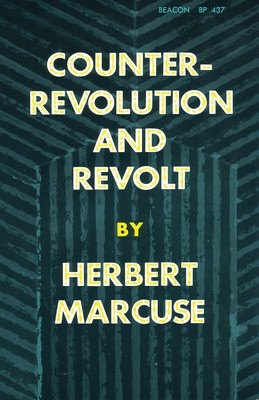
- We will send in 10–14 business days.
- Author: Herbert Marcuse
- Publisher: Beacon Press
- ISBN-10: 0807015334
- ISBN-13: 9780807015339
- Format: 14.2 x 21.4 x 1.2 cm, minkšti viršeliai
- Language: English
- SAVE -10% with code: EXTRA
Reviews
Description
In this book Herbert Marcuse makes clear that capitalism is now reorganizing itself to meet the threat of a revolution that, if realized, would be the most radical of revolutions: the first truly world-historical revolution. Capitalism's counterrevolution, however, is largely preventive, and in the Western world altogether preventive. Yet capitalism is producing its own grave-diggers, and Marcuse suggests that their faces may be very different from those of the wretched of the earth.
The future revolution will be characterized by its enlarged scope, for not only the economic and political structure, not only class relatoins, but also humanity's relation to nature (both human and external nature) tend toward radical transformation. For the author, the "liberation of nature" is the connecting thread between the economic-political and the cultural revolution, between "changing the world" and personal emancipation.EXTRA 10 % discount with code: EXTRA
The promotion ends in 23d.07:12:49
The discount code is valid when purchasing from 10 €. Discounts do not stack.
- Author: Herbert Marcuse
- Publisher: Beacon Press
- ISBN-10: 0807015334
- ISBN-13: 9780807015339
- Format: 14.2 x 21.4 x 1.2 cm, minkšti viršeliai
- Language: English English
In this book Herbert Marcuse makes clear that capitalism is now reorganizing itself to meet the threat of a revolution that, if realized, would be the most radical of revolutions: the first truly world-historical revolution. Capitalism's counterrevolution, however, is largely preventive, and in the Western world altogether preventive. Yet capitalism is producing its own grave-diggers, and Marcuse suggests that their faces may be very different from those of the wretched of the earth.
The future revolution will be characterized by its enlarged scope, for not only the economic and political structure, not only class relatoins, but also humanity's relation to nature (both human and external nature) tend toward radical transformation. For the author, the "liberation of nature" is the connecting thread between the economic-political and the cultural revolution, between "changing the world" and personal emancipation.

Reviews